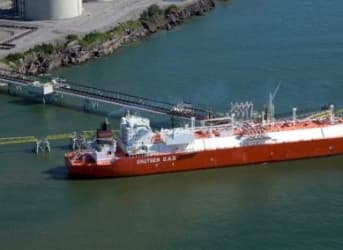As the Lax Kw’alaams community rejected a $1 billion offer from Pacific NorthWest LNG as compensation for a proposed natural gas project this week, the global energy community took notice. With the native tribe turning down such an enormous sum of money, the rejection could put a chill on Canada’s energy investment prospects. Worse, it also raised the possibility that Canada would be shut out of the vast Asian markets that it needs to offload the natural gas the United States no longer wants. But the reality is more nuanced than that.
Community engagement has become far more important for oil and gas projects, and in accordance with international best practices, indigenous communities should be involved in a process of free, prior, and informed consultation. Cases in Canada, and across the Western Hemisphere, have shown that agreement between governments, private firms, and indigenous communities is possible. And when done well, everyone stands to gain.
Pacific NorthWest LNG, which is owned by Malaysian national oil company Petronas plus Sinopec, JAPEX, Indian Oil Corporation, and Petroleum Brunei, has been negotiating with the Lax Kw’alaams band council since 2011. The major point of contention is over the impact of the project on local fisheries, in particular salmon. Both sides have commissioned environmental reviews that come to different conclusions. Pacific NorthWest has offered to build a bridge it argues will protect the area, but the community is dissatisfied with the solution. The Canadian Environmental Agency’s own review is due later this year. Related: Petronas Hoping To Buy First Nations Tribes’ Support For $1 Billion
This is not the first project to experience backlash on Canada’s Pacific Coast; nor will it be the last. There are proposals for 17 liquefied natural gas (LNG) projects and six pipelines in the works in northern British Columbia alone. Across Canada, there has been conflict with indigenous and environmental communities over a slew of energy infrastructure projects, including the $6.3 billion Northern Gateway pipeline, which would carry 525,000 barrels of oil per day from the oil sands to the West Coast and then to Asian markets. Enbridge, which is building the pipeline, has been told by the federal government it must do more to engage First Nations affected along the route.
Social responsibility is hardly a new concept but the way in which it needs to be implemented has changed. Oil, gas and infrastructure companies in Canada are learning the hard way that throwing money and development projects at local communities is insufficient and sometimes harmful. Having seen so many projects delayed or blocked, corporate executives should take note. The same lesson is coming out of experiences from Australia to South America. Related: How Much Longer Can The Oil Age Last?
Canada has not ratified the International Labour Organization’s Convention 169 on indigenous and tribal peoples and the government has been criticized for its lack of engagement with aboriginal groups over large scale projects. Last year, a Supreme Court ruling gave greater rights to Canada’s indigenous communities to be consulted about projects affecting their territory. The Court, in line with international precedent, stopped short of granting a veto power.
Community concerns in Canada are only going to become an ever-greater hurdle in the future. It is promising that most oil and gas executives agree that it is cheaper to get community consultation right from the outset, and this is where the government’s responsibility to initiate and facilitate the process comes into play. And in many cases, indigenous communities welcome economic development and simply wish to engage in a transparent consultation process that recognizes their rights and addresses their concerns. Related: The Latest Casualty In Energy’s Hardest Hit Industry
In this case, the Lax Kw’alaams rejected the $1 billion offer and said in a press release that foregoing such a staggering sum hopefully “sends an unequivocal message this is not a money issue: this is environmental and cultural.” The group remains open to continue the dialogue and work with Pacific NorthWest LNG to find a solution. The band council’s press release explicitly acknowledges the economic benefits that oil and gas development could bring to their community and British Columbia as a whole.
For those concerned about Asian investors decamping to Canada’s competitors, both Australia and the US have their own problems. LNG projects in Australia are expensive, with one McKinsey & Co. study finding that it cost 20 - 30 percent more to build a project in Australia than in the US or East Africa. The United States, while moving ahead with LNG export projects still has a lot of legal hurdles through which to jump when exporting LNG to countries without a free trade agreement with the US.
At the end of the day, Canada’s Pacific Coast still holds enormous potential for LNG exports and this latest hurdle is not insurmountable. But Canada’s economic development and energy superpower status will rely on striking the right balance between private economic interests and social and environmental concerns. How proposals such as Pacific NorthWest LNG proceed will no doubt influence future projects’ success.
ADVERTISEMENT
By Alexis Arthur of Oilprice.com
More Top Reads From Oilprice.com:
- Oil Markets Have Little To Fear From Iran For Now
- 3 Ways Oil Companies Can Survive Low Prices
- Could This New Business Model Save Fracking?


















